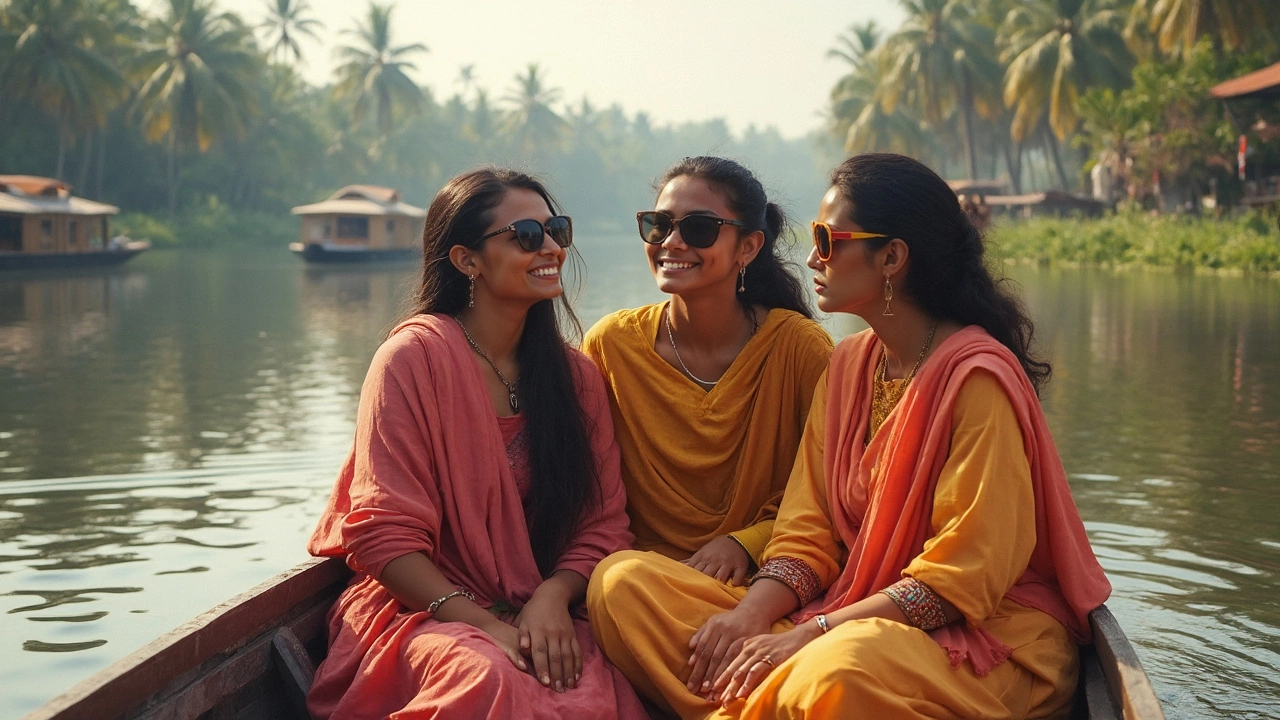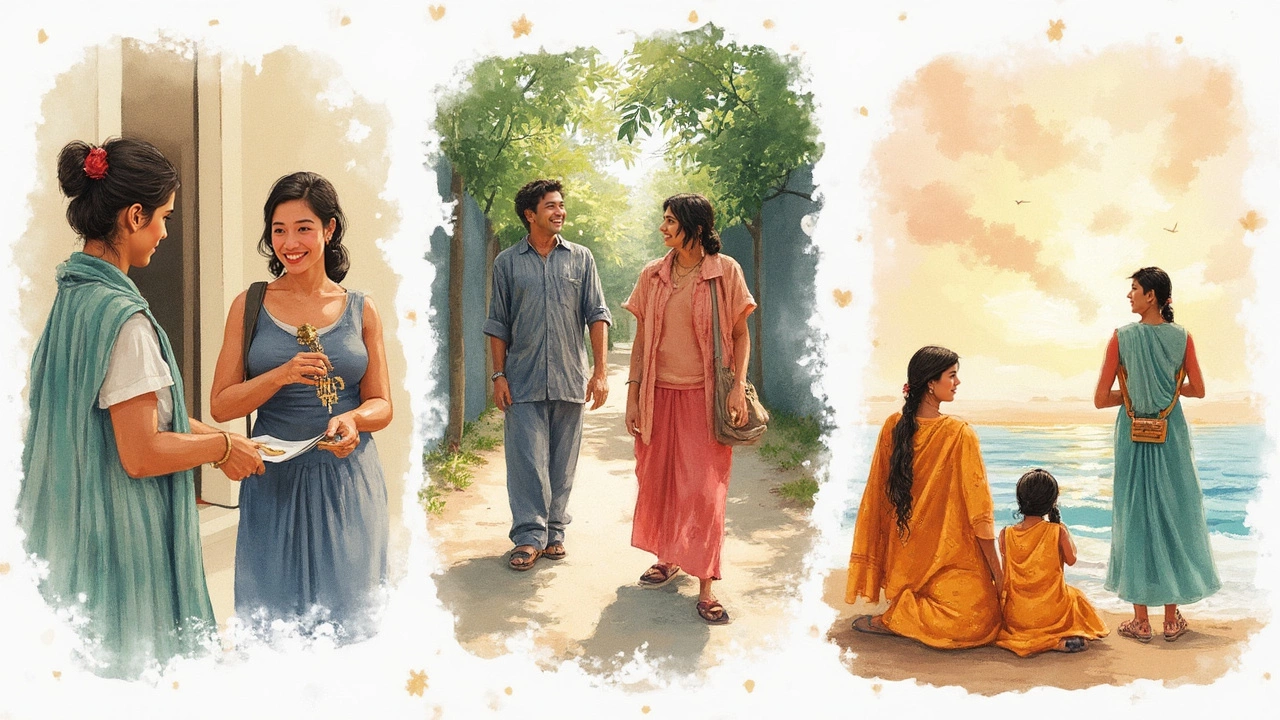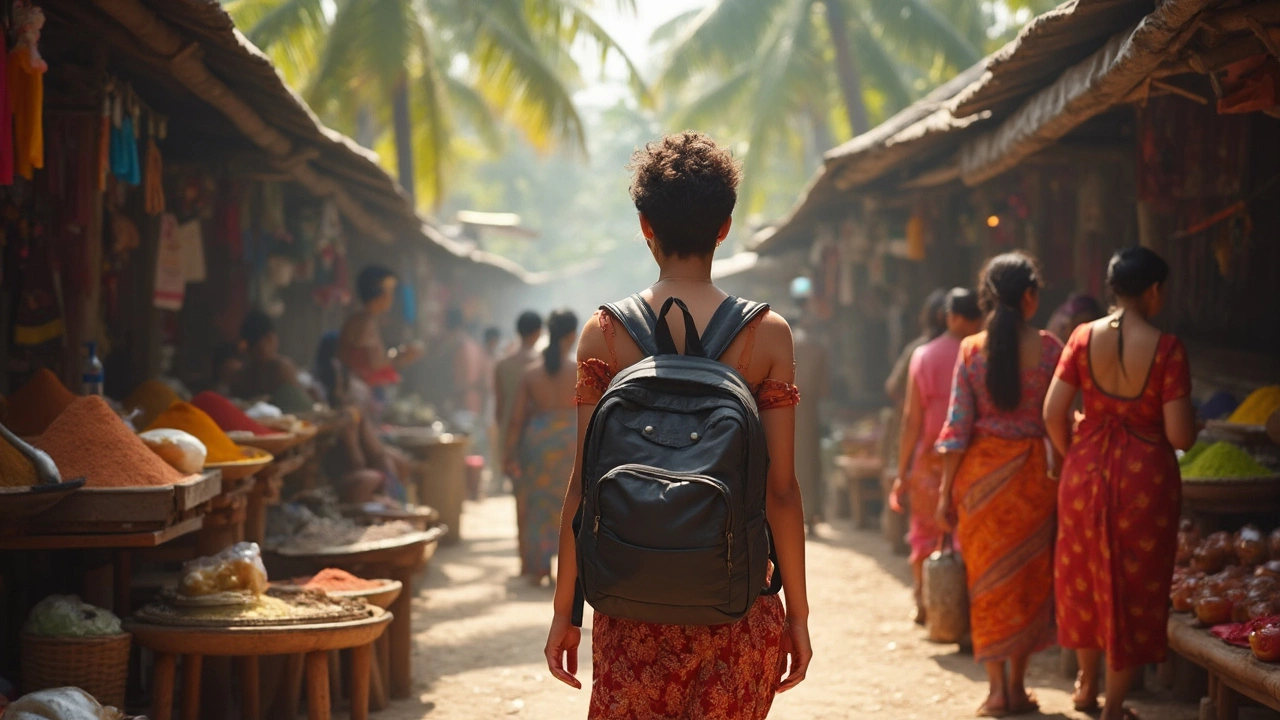The internet can make it sound either dreamy or dicey for women traveling solo in Kerala. Here’s the bottom line: Kerala is one of India’s safer states for female travellers, but you still need to keep your wits about you. Locals are generally respectful, and you’ll find women working everywhere—from shops to government offices. But like anywhere, things can feel different when you look a bit lost or don’t know the local routines.
You might love that Kerala’s buses and trains have ‘ladies’ sections—less crowded, no awkward stares. Still, don’t let your guard down. Basic stuff helps: lock your bag, say no to rides with strangers, keep your phone charged. Whether you’re staring up at the Chinese fishing nets in Kochi or sipping chai in a sleepy backwater village, trust your gut if something feels off.
- First Impressions & Social Attitudes
- Street Smarts: Getting Around Kerala
- Dress, Customs, and Local Etiquette
- Accommodation: What To Expect
- Real Stories & Top Safety Tips
First Impressions & Social Attitudes
Kerala greets you with lush scenery and, for the most part, friendly faces. People here are used to tourists, especially in popular spots like Fort Kochi, Alleppey, or Varkala. Still, as a woman—especially if you stand out—you’ll catch some curious glances. Most of it is harmless, just folks interested in seeing someone new. You’ll find locals generally polite and willing to help, especially if you’re straightforward in your requests.
Lots of Keralites work abroad, so you might notice an openness to outsiders. Education levels are high too; Kerala actually has the highest literacy rate in India, over 96%. That plays into daily life—men and women both work, and you’ll spot women in senior jobs at banks, schools, and even the police. Most younger folks speak at least some English, so asking for directions isn’t a huge hassle.
| Kerala Quick Facts | 2024 Data |
|---|---|
| Literacy Rate | 96.2% |
| Female Workforce Participation | 22.6% |
| Crime Rate (per lakh population, 2023) | 2577.8 (among lowest in India) |
Compared to other parts of India, Kerala safety truly does feel more relaxed for female travellers—there are fewer catcalls or unwanted attention. That said, if you’re walking alone at night, especially outside touristy zones, expect some extra looks. In more rural spots, people might be surprised to see a woman alone, but it’s usually just surprise, not hostility.
If you visit during festivals or temple events, expect crowded spaces. Personal space shrinks, but people are more focused on the event than on you. Many solo women say they’ve felt less hassled here than in big northern cities. The vibe is conservative but not uptight: folks won’t be shocked by a foreign woman, just a bit curious. A smile and a friendly nod go a long way.
Street Smarts: Getting Around Kerala
Navigating Kerala is simpler than you might think, even for female travellers new to India. Local buses, auto-rickshaws, and trains cover most areas, and they tend to run on time—for India, that’s saying a lot. In bigger cities like Kochi and Thiruvananthapuram, public transport is cheap and the 'ladies only' compartments on buses and trains offer peace of mind during crowded hours.
Prefer taxis? Apps like Ola and Uber operate in most cities, and they’re safer than just hailing a cab off the street. Always check the driver's name and number plate and share your ride details with someone you trust. Don’t feel awkward about canceling a ride if something seems off. In the countryside or smaller beach towns, auto-rickshaws are best—but confirm the fare before hopping in, since meters can be "broken" more often than not. Try using a prepaid auto counter at train and bus stations if it’s there.
If you’re planning late-night outings, line up your ride back before you go. While Kerala isn’t famous for a wild nightlife scene, events sometimes finish after dark, and streets get pretty empty by 10 PM. Walking alone after that isn’t recommended, especially in quiet areas—better safe than sorry.
Here are some tips to make getting around safer and easier:
- Kerala safety tip: Take a photo of the vehicle license plate before every ride and send it to a friend or family member.
- Carry small cash for fares and avoid flashing expensive gadgets.
- Map out your route in advance if you’re using public buses—Google Maps works well in most cities and main towns.
- For solo women, sitting in the front or next to another woman on buses or trains usually avoids unwanted attention.
- If you ever feel uncomfortable, don’t hesitate to get off at the next safe stop or move closer to the driver in an auto.
One quick fact that might surprise you: Kerala has a higher literacy rate than most parts of India, so you’ll often find people who speak enough English to help you out. Even so, writing down your destination in Malayalam (the local language) helps with drivers outside the touristy areas.

Dress, Customs, and Local Etiquette
If you want to blend in and avoid unwanted attention as a female traveller in Kerala, what you wear matters a lot. It’s not about changing who you are—just making life easier and showing respect to local traditions. You’ll notice most women in Kerala wear saris, salwar kameez, or long skirts with tops. Jeans are common among younger women in cities, but shorts and tank tops are rare, especially in rural spots. Your safest bet? Stick to loose, comfortable clothes that cover your arms and knees.
For temples and churches, dress codes get stricter. Most places will ask you to cover your shoulders and legs—sometimes even your head. Some Hindu temples won’t allow non-Hindus inside at all, so check before you go. Many temples provide shawls or wraps, but it’s always handy to keep a scarf in your bag—useful for sudden temple visits or to ward off the coastal sun.
- Don’t wear shoes inside homes or temples—leave them at the door.
- If you get invited to a local’s home, bring a small gift (sweets or fruit totally work).
- It’s typical to greet people with a friendly ‘namaste’, joining your hands together.
- Public displays of affection (like hugging or kissing) are uncommon and can make people uncomfortable.
Kerala’s culture is friendly but a bit reserved. If you get curious glances, it’s mostly about curiosity, not malice. Locals might ask where you’re from or if you’re travelling alone. Just keep it light and polite.
“Travelling in Kerala is fairly straightforward for women if you dress modestly and respect the cultural vibe. People are warm and helpful, but you’ll get more out of them if you follow local customs.”
– Shivya Nath, travel writer and solo adventurer
Interesting fact: Kerala’s literacy rate is over 96%. People here value education and can speak some basic English just about everywhere. So, if you fumble with words or customs, someone nearby will usually help you out.
Bottom line: a little effort with dress and etiquette goes a long way in making your stay smooth and safe in Kerala.
Accommodation: What To Expect
Kerala has all kinds of places to stay, from eco-resorts and houseboats to cheap guesthouses and modern hotels. If you’re a female traveller, most folks recommend picking either mid-range hotels, homestays, or well-rated hostels in touristy areas like Fort Kochi, Varkala, or Munnar. These spots are used to travellers and have staff who can help if you have questions or run into problems. Many places even offer female-only dorms or floors.
Booking apps are handy, but in Kerala, reading recent reviews (especially from other female travellers) makes a real difference. Check for comments about security, staff behavior, and location—some neighborhoods can feel deserted after dark. If you’re staying in a homestay, don’t be shy about messaging the host in advance and asking about lockable doors, whether the property is run by a family, or if there’s someone on site at night. Most hosts are happy to give straight answers.
Night arrivals at isolated spots are best avoided. Instead, plan to reach before sunset or arrange a pickup—even basic guesthouses can set this up if you ask. If you’re trying a houseboat in Alleppey, choose a company with a good safety record and don’t hesitate to say you’d prefer other guests or families on board, just for peace of mind.
Here’s what matters when picking a place to stay in Kerala:
- Look for properties with 24/7 reception or a security guard.
- Opt for hotels or hostels that offer female-only spaces, especially if you’re solo.
- Avoid isolated accommodations (like some remote beach shacks or poorly lit areas) unless you’re traveling with a group.
- Always check for recent reviews mentioning safety and cleanliness—not just fancy photos.
- Book transport from bus/rail stations at night in advance, or ask your accommodation to arrange it.
Here’s a quick look at how accommodations usually stack up on useful safety features for female travellers:
| Type | Reception/Staff | Female-only Options | Typical Location |
|---|---|---|---|
| Budget Hostels | Daytime, Some 24/7 | Often Available | Cities, Tourist Towns |
| Homestays | Family On Site | Sometimes Available | Urban / Rural |
| Hotels (3-star+) | 24/7 | Rare | Cities, Main Towns |
| Houseboats | Staff On Board | No | Rivers, Backwaters |
Bottom line? With smart choices, you can sleep easy. Kerala’s hospitality is real, but don’t ignore your instincts. If something feels off, swap your booking or ask for help. Safe travels!

Real Stories & Top Safety Tips
If you search for posts from solo women in Kerala, you’ll see a pattern: most call it Kerala safety legit compared to busier Indian states. Emma, a Canadian backpacker, wrote about taking rickshaws in Kochi and never feeling threatened—just stared at, which happens everywhere in India. Julia from the UK said train travel was stress-free thanks to ‘ladies only’ coaches, though a local aunty did remind her to always keep her bag close, even while dozing off.
But it’s not perfect. One traveller shared how she got harassed on a crowded bus in Trivandrum—but as soon as she stood up and started yelling, people stepped in, and the driver booted the harasser at the next stop. Kerala’s literacy rate is the highest in India, and women often have more visibility in public spaces here. Still, as a female traveller, you have to set boundaries.
Here are the top safety tips from seasoned visitors and locals—and they work whether you’re a solo woman or not:
- Book a hotel or homestay with plenty of recent positive reviews from women. Check for words like “safe,” “friendly staff,” and “good neighborhood.”
- If you go out at night, stick to well-lit streets. In many smaller towns, everything shuts early, so don’t expect the clubs or late-night cafes you might see in Mumbai or Delhi.
- Save the name and address of your hotel on your phone—rickshaw drivers might not recognize your accent or pronunciation.
- When using public transport, sit in the women’s compartment if it’s available. It’s not just tradition; it’s a simple way to cut down on hassle.
- If you’re uncomfortable, don’t be shy about calling attention to it. Kerala locals usually help women in distress.
- Carry a local SIM card with data. Google Maps is your best friend when you’re lost or need to check taxi routes.
- Dress like local women if you want fewer stares—think long skirts, loose pants, light scarves. In touristy places, people are used to Western clothes, but blending in makes daily travel easier.
Here’s a quick look at survey results from a 2023 study by the Kerala Tourism Department about how female travellers felt during their trips:
| Feeling Safe | Positive Support From Locals | Faced Harassment |
|---|---|---|
| 84% | 79% | 13% |
There’s no such thing as 100% safe—anywhere. But Kerala stands out for its friendly people, supportive attitude, and more relaxed pace. Prepare, be aware, and just enjoy the beauty all around you.
